Command
An app is just the tip of the iceberg. App analytics, API performance, cloud costs, and user feedback produce a torrent of potentially valuable data, 24/7. Let Command combine them so you can make those business critical insights.
An app is just the tip of the iceberg. App analytics, API performance, cloud costs, and user feedback produce a torrent of potentially valuable data, 24/7. Let Command combine them so you can make those business critical insights.









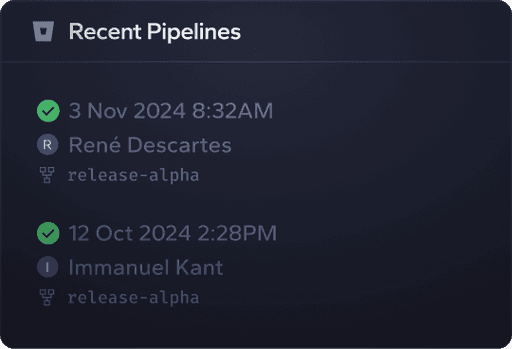


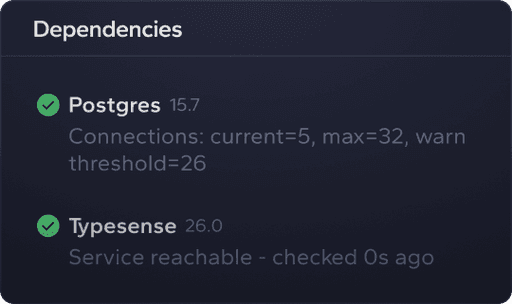


Used by some of Australia’s largest organisations
Features
The forest for the trees
Your digital assets comprise many moving parts. Whether you have one app or many, internal or external customers, own the front or the backend or both, or rely on third-party integrations, Command monitoring will surface the things that matter.
Plug in popular app and backend analytics out-of-the-box
Manage who can see what with self-serve, permissions-based visibility
Opt-in to finer-grained health monitoring over time as you upgrade your backends
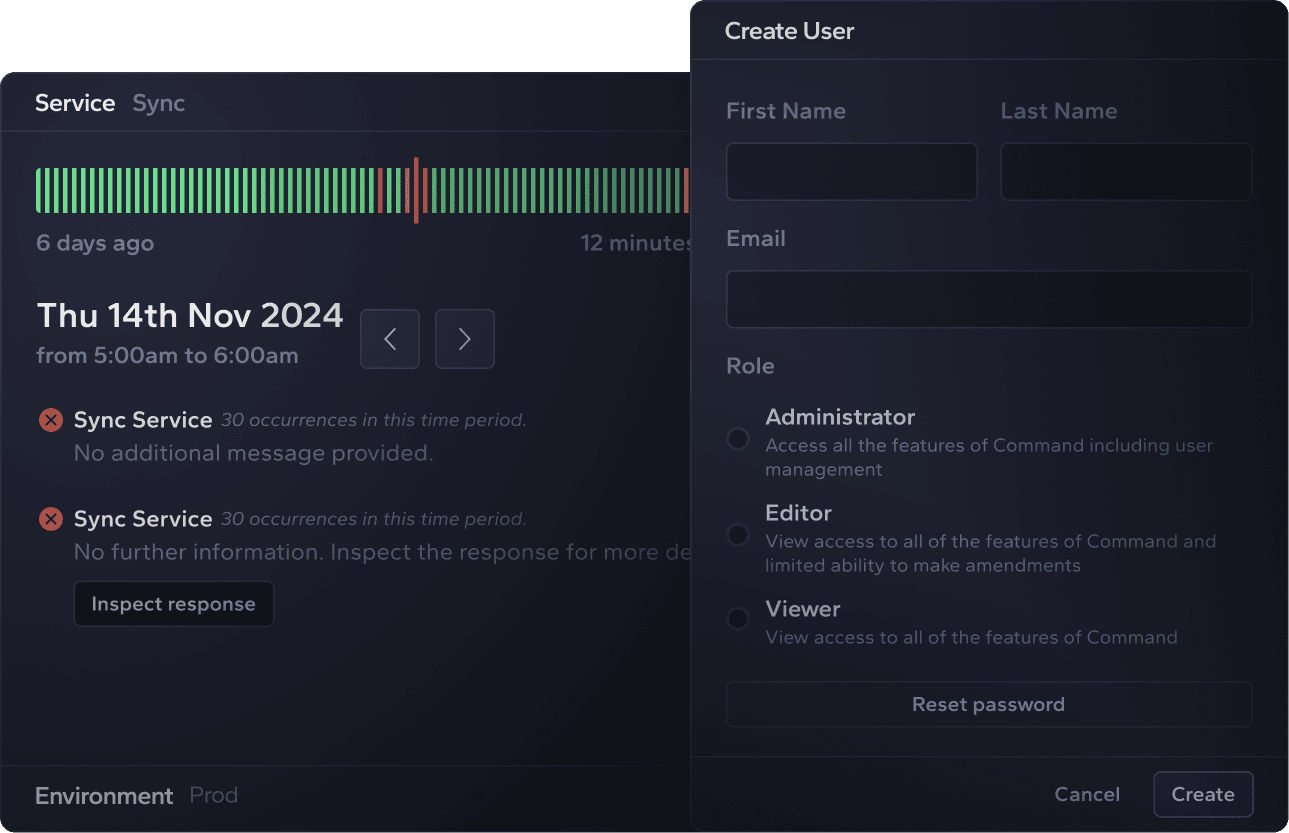
Features
The forest for the trees
Your digital assets comprise many moving parts. Whether you have one app or many, internal or external customers, own the front or the backend or both, or rely on third-party integrations, Command monitoring will surface the things that matter.
Plug in popular app and backend analytics out-of-the-box
Manage who can see what with self-serve, permissions-based visibility
Opt-in to finer-grained health monitoring over time as you upgrade your backends

Features
The forest for the trees
Your digital assets comprise many moving parts. Whether you have one app or many, internal or external customers, own the front or the backend or both, or rely on third-party integrations, Command monitoring will surface the things that matter.
Plug in popular app and backend analytics out-of-the-box
Manage who can see what with self-serve, permissions-based visibility
Opt-in to finer-grained health monitoring over time as you upgrade your backends

Features
The forest for the trees
Your digital assets comprise many moving parts. Whether you have one app or many, internal or external customers, own the front or the backend or both, or rely on third-party integrations, Command monitoring will surface the things that matter.
Plug in popular app and backend analytics out-of-the-box
Manage who can see what with self-serve, permissions-based visibility
Opt-in to finer-grained health monitoring over time as you upgrade your backends

Features
Close the loop
Get visibility on your app all the way from dev to release and beyond.
Integrate with your code repos to watch builds drop, distribute them to test, and know what features made it in
See your third party dependencies and be warned about potential security vulnerabilities as they arise
Track app releases and key events, and watch how they’re received in the Stores
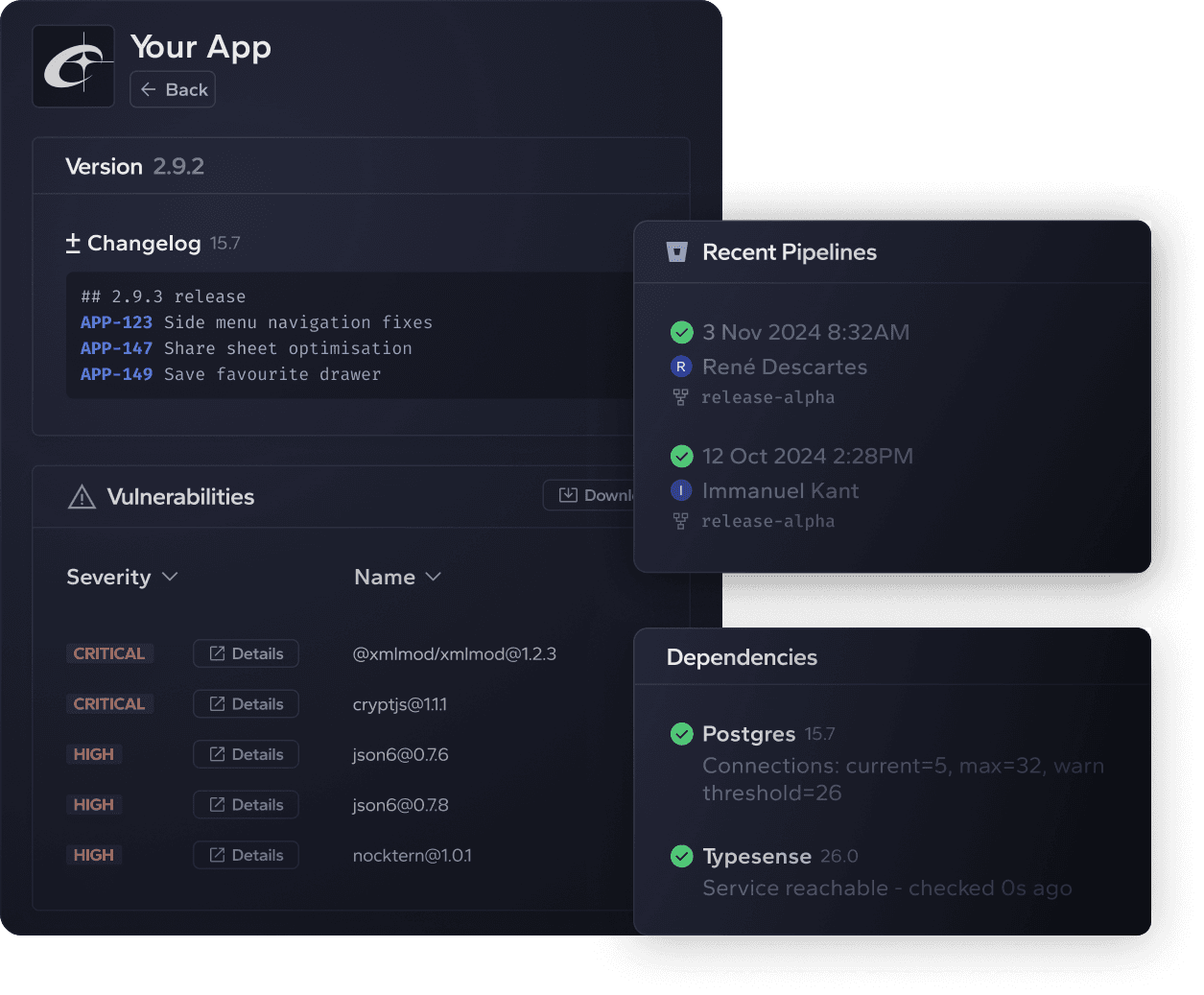
Features
Close the loop
Get visibility on your app all the way from dev to release and beyond.
Integrate with your code repos to watch builds drop, distribute them to test, and know what features made it in
See your third party dependencies and be warned about potential security vulnerabilities as they arise
Track app releases and key events, and watch how they’re received in the Stores

Features
Close the loop
Get visibility on your app all the way from dev to release and beyond.
Integrate with your code repos to watch builds drop, distribute them to test, and know what features made it in
See your third party dependencies and be warned about potential security vulnerabilities as they arise
Track app releases and key events, and watch how they’re received in the Stores

Features
Close the loop
Get visibility on your app all the way from dev to release and beyond.
Integrate with your code repos to watch builds drop, distribute them to test, and know what features made it in
See your third party dependencies and be warned about potential security vulnerabilities as they arise
Track app releases and key events, and watch how they’re received in the Stores

Features
Customise
No matter the promises, one size never fits all. Command was built from scratch to support deep customisation.
Let us customise your Command install -- anything from an additional screen or two, to full-blown webapps for your business domain
Integrate with your existing business systems or knowledge bases to supercharge your insights
Extend Command’s ETL pipelines to ingest any kind of data and generate new visualisations through configuration
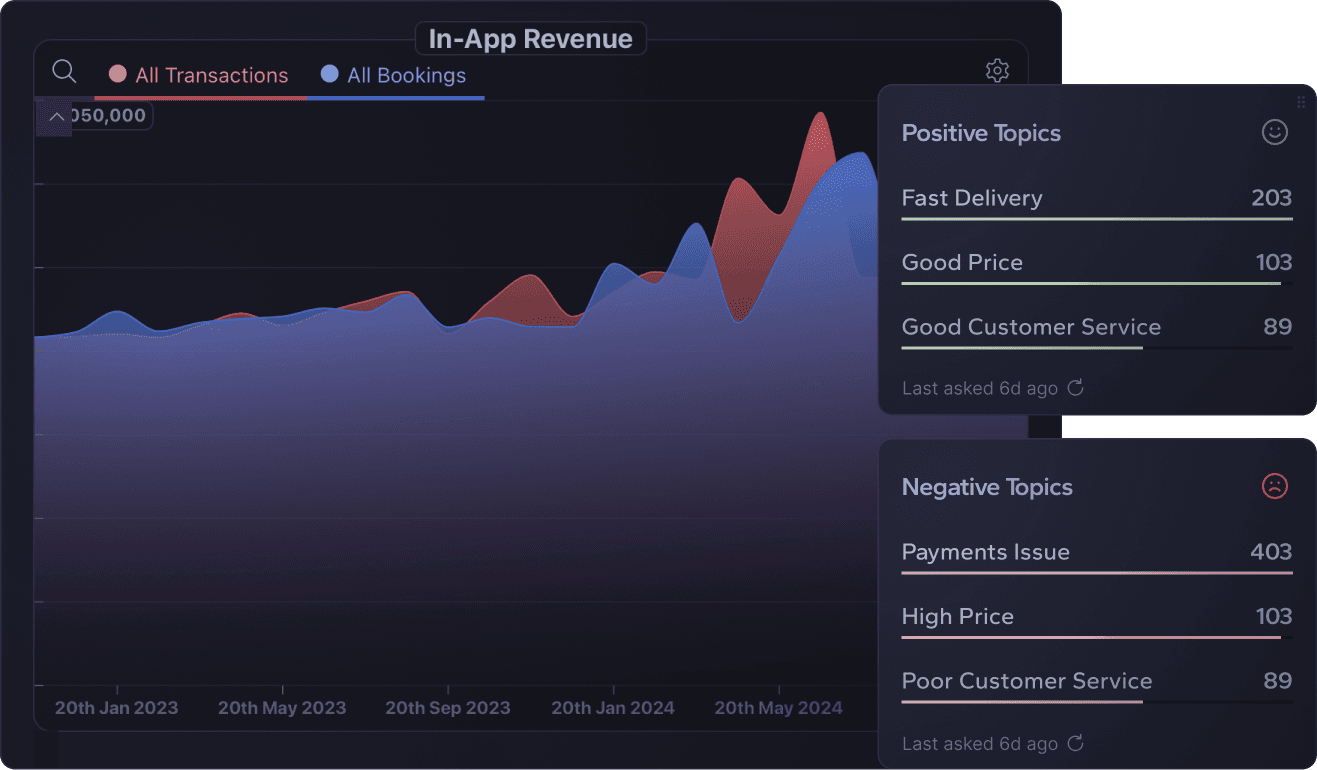
Features
Customise
No matter the promises, one size never fits all. Command was built from scratch to support deep customisation.
Let us customise your Command install -- anything from an additional screen or two, to full-blown webapps for your business domain
Integrate with your existing business systems or knowledge bases to supercharge your insights
Extend Command’s ETL pipelines to ingest any kind of data and generate new visualisations through configuration

Features
Customise
No matter the promises, one size never fits all. Command was built from scratch to support deep customisation.
Let us customise your Command install -- anything from an additional screen or two, to full-blown webapps for your business domain
Integrate with your existing business systems or knowledge bases to supercharge your insights
Extend Command’s ETL pipelines to ingest any kind of data and generate new visualisations through configuration

Features
Customise
No matter the promises, one size never fits all. Command was built from scratch to support deep customisation.
Let us customise your Command install -- anything from an additional screen or two, to full-blown webapps for your business domain
Integrate with your existing business systems or knowledge bases to supercharge your insights
Extend Command’s ETL pipelines to ingest any kind of data and generate new visualisations through configuration

More features
The complete app management solution
Monitor apps, APIs, everything in minutes
Configure Command to watch the health of vital systems—from RUOK? to detailed upstream dependencies.
Monitor apps, APIs, everything in minutes
Configure Command to watch the health of vital systems—from RUOK? to detailed upstream dependencies.
Monitor apps, APIs, everything in minutes
Configure Command to watch the health of vital systems—from RUOK? to detailed upstream dependencies.
Monitor apps, APIs, everything in minutes
Configure Command to watch the health of vital systems—from RUOK? to detailed upstream dependencies.
Switch from the big picture to the detail with a click
When things go pear-shaped cut through the noise to the root problem.
Switch from the big picture to the detail with a click
When things go pear-shaped cut through the noise to the root problem.
Switch from the big picture to the detail with a click
When things go pear-shaped cut through the noise to the root problem.
Switch from the big picture to the detail with a click
When things go pear-shaped cut through the noise to the root problem.
Watch your features ship and gain traction
See releases alongside key metrics and user feedback.
Watch your features ship and gain traction
See releases alongside key metrics and user feedback.
Watch your features ship and gain traction
See releases alongside key metrics and user feedback.
Watch your features ship and gain traction
See releases alongside key metrics and user feedback.
Track dev progress in one place
Plug into your code repositories and get the latest builds and changelogs.
Track dev progress in one place
Plug into your code repositories and get the latest builds and changelogs.
Track dev progress in one place
Plug into your code repositories and get the latest builds and changelogs.
Track dev progress in one place
Plug into your code repositories and get the latest builds and changelogs.
Know your dependencies and vulnerabilities
Stay abreast of third-party dependencies in your code, license requirements, and security vulnerabilities.
Know your dependencies and vulnerabilities
Stay abreast of third-party dependencies in your code, license requirements, and security vulnerabilities.
Know your dependencies and vulnerabilities
Stay abreast of third-party dependencies in your code, license requirements, and security vulnerabilities.
Know your dependencies and vulnerabilities
Stay abreast of third-party dependencies in your code, license requirements, and security vulnerabilities.
Distill your analytics into insights
Turn your big data into real insight with simple custom configuration.
Distill your analytics into insights
Turn your big data into real insight with simple custom configuration.
Distill your analytics into insights
Turn your big data into real insight with simple custom configuration.
Distill your analytics into insights
Turn your big data into real insight with simple custom configuration.
Generate notifications for anything
Be alerted to conditions of interest happening in all of your digital assets.
Generate notifications for anything
Be alerted to conditions of interest happening in all of your digital assets.
Generate notifications for anything
Be alerted to conditions of interest happening in all of your digital assets.
Generate notifications for anything
Be alerted to conditions of interest happening in all of your digital assets.
Integrate with industry standard providers
Connect out-of-the-box or request an importer for your favourite platform.
Integrate with industry standard providers
Connect out-of-the-box or request an importer for your favourite platform.
Integrate with industry standard providers
Connect out-of-the-box or request an importer for your favourite platform.
Integrate with industry standard providers
Connect out-of-the-box or request an importer for your favourite platform.
Build your own features into Command
Create new widgets, behaviours, and connectors in NextJS and golang, with unlimited mix-ins.
Build your own features into Command
Create new widgets, behaviours, and connectors in NextJS and golang, with unlimited mix-ins.
Build your own features into Command
Create new widgets, behaviours, and connectors in NextJS and golang, with unlimited mix-ins.
Build your own features into Command
Create new widgets, behaviours, and connectors in NextJS and golang, with unlimited mix-ins.
Book a Demo
Reach out to us and we'll organise a demo with you to run through Command's full capabilities.
Book a Demo
Reach out to us and we'll organise a demo with you to run through Command's full capabilities.
Book a Demo
Reach out to us and we'll organise a demo with you to run through Command's full capabilities.
Book a Demo
Reach out to us and we'll organise a demo with you to run through Command's full capabilities.
Our clients success is our success
“Adapptor are not just a vendor/supplier, they are a valued business partner who take a responsive and proactive approach to collaborate with our business in order to deliver fantastic digital solutions.”
Mark Johnson
Chief Product Officer at Wilson Parking
Our clients success is our success
“Adapptor are not just a vendor/supplier, they are a valued business partner who take a responsive and proactive approach to collaborate with our business in order to deliver fantastic digital solutions.”
Mark Johnson
Chief Product Officer at Wilson Parking
Our clients success is our success
“Adapptor are not just a vendor/supplier, they are a valued business partner who take a responsive and proactive approach to collaborate with our business in order to deliver fantastic digital solutions.”
Mark Johnson
Chief Product Officer at Wilson Parking
Our clients success is our success
“Adapptor are not just a vendor/supplier, they are a valued business partner who take a responsive and proactive approach to collaborate with our business in order to deliver fantastic digital solutions.”
Mark Johnson
Chief Product Officer at Wilson Parking
from the blog
Latest Insights
A rising tide lifts all boats. Dig into our latest learnings.
from the blog
Latest Insights
A rising tide lifts all boats. Dig into our latest learnings.
from the blog
Latest Insights
A rising tide lifts all boats. Dig into our latest learnings.
from the blog
Latest Insights
A rising tide lifts all boats. Dig into our latest learnings.




